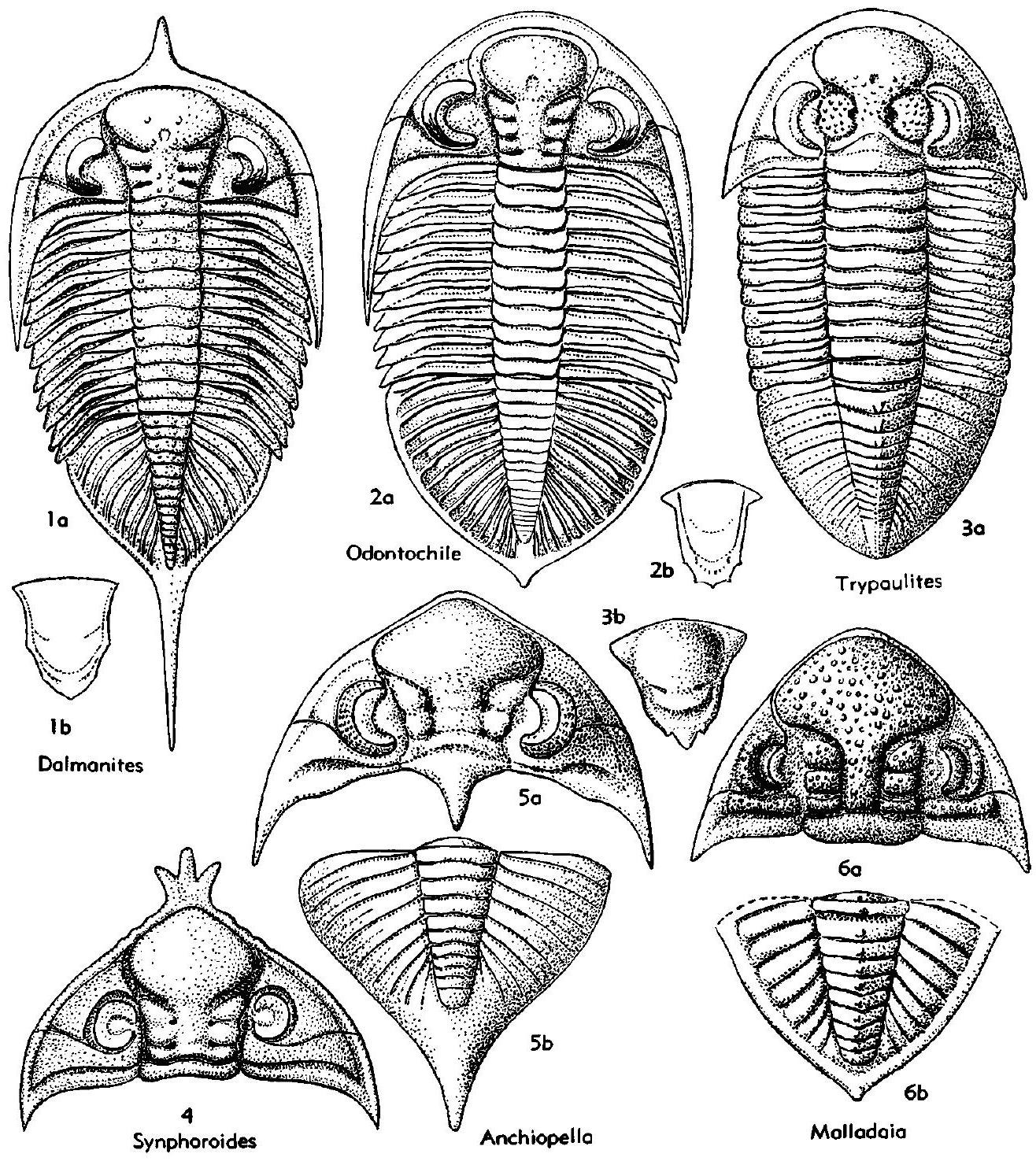Welcome to the Treatise on Invertebrate Paleontology!
Please enter a genera name to retrieve more information.

Odontochile
Classification
Phylum:
Arthropoda
Subphylum:
Trilobitomorpha
Class:
Trilobita
Order:
Phacopida
Suborder:
Phacopina
Superfamily:
Dalmanitacea
Family:
Dalmanitidae
Subfamily:
Dalmanitinae
Formal Genus Name and Reference:
Odontochile Hawle & Corda, 1847
Type Species:
Asaphus hatismanni Brongniart, 1822, SD Tripp & Whit- TARD, 1956 (ICZN pend.)
Images
(Click to enlarge in a new window)
Fig. 371, 2. *O. hausmanni (Brongniart), M.Dev., Czech., 2 a, b, exoskel., hypostoma, x1 (3).
Synonyms
Geographic Distribution
Eu.-N.Am.-S.Am.-Austral.
Age Range
Beginning Stage in Treatise Usage:
L.Dev.
Beginning International Stage:
Lochkovian
Fraction Up In Beginning Stage:
0
Beginning Date:
419
Ending Stage in Treatise Usage:
M. Dev.
Ending International Stage:
Givetian
Fraction Up In Ending Stage:
100
Ending Date:
378.9
Description
Cephalon resembling that of Dalmanites, but anterior sections of facial sutures distant from glabellar frontal lobe, Hypostoma with 5 to 7 denticles along posterior edge, Pygidium very long, with 16 to 22 rings and 12 to 15 pairs of ribs, doublure broad
References
Museum or Author Information
Classification
Phylum:
Arthropoda
Subphylum:
Trilobitomorpha
Class:
Trilobita
Order:
Phacopida
Suborder:
Phacopina
Superfamily:
Dalmanitacea
Family:
Dalmanitidae
Subfamily:
Dalmanitinae
Formal Genus Name and Reference:
Odontochile Hawle & Corda, 1847
Type Species:
Asaphus hatismanni Brongniart, 1822, SD Tripp & Whit- TARD, 1956 (ICZN pend.)
Images
(Click to enlarge in a new window)
Fig. 371, 2. *O. hausmanni (Brongniart), M.Dev., Czech., 2 a, b, exoskel., hypostoma, x1 (3).
Synonyms
Geographic Distribution
Eu.-N.Am.-S.Am.-Austral.
Age Range
Beginning Stage in Treatise Usage:
L.Dev.
Beginning International Stage:
Lochkovian
Fraction Up In Beginning Stage:
0
Beginning Date:
419
Ending Stage in Treatise Usage:
M. Dev.
Ending International Stage:
Givetian
Fraction Up In Ending Stage:
100
Ending Date:
378.9
Description
Cephalon resembling that of Dalmanites, but anterior sections of facial sutures distant from glabellar frontal lobe, Hypostoma with 5 to 7 denticles along posterior edge, Pygidium very long, with 16 to 22 rings and 12 to 15 pairs of ribs, doublure broad
